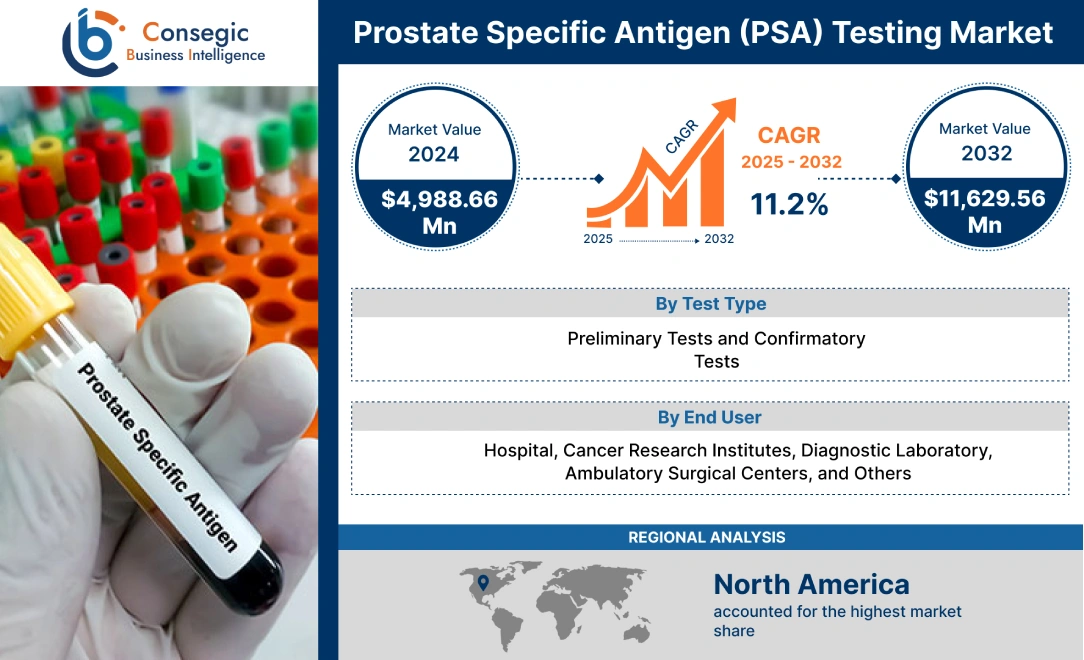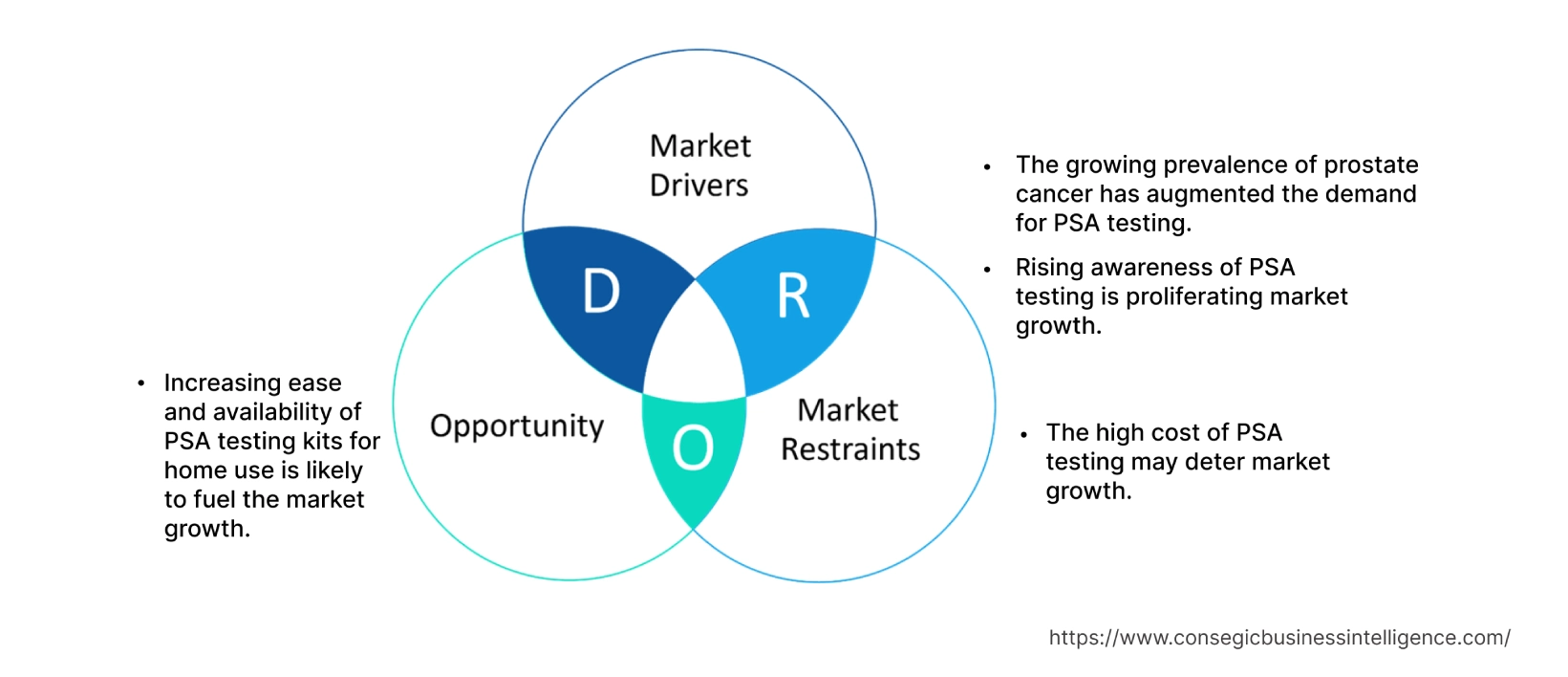- Summary
- Table Of Content
- Methodology
Prostate Specific Antigen (PSA) Testing Market Size :
Prostate Specific Antigen (PSA) Testing Market size is estimated to reach over USD 11,629.56 Million by 2032 from a value of USD 4,988.66 Million in 2024 and is projected to grow by USD 5,456.51 Million in 2025, growing at a CAGR of 11.20% from 2025 to 2032.
Prostate Specific Antigen (PSA) Testing Market Scope & Overview:
The Prostate Specific Antigen (PSA) test is a type of blood test commonly used as a screening tool for prostate cancer. The test is performed to measure the level of PSA, a protein produced by the prostate gland, in the blood, and elevated levels of PSA may suggest the presence of prostate cancer or other prostate-related conditions. The testing allows for early detection, improved treatment outcomes, and a better understanding of prostate health. The market for PSA testing includes various products and services associated with the testing process.
Prostate Specific Antigen (PSA) Testing Market Insights :
Prostate Specific Antigen (PSA) Testing Market Dynamics - (DRO) :
Key Drivers :
The growing prevalence of prostate cancer has augmented the demand for PSA testing
As the incidence of prostate cancer continues to rise, individuals and healthcare providers recognize the importance of early detection and screening. As a result, there is a greater emphasis on early detection and screening, driving up the demand for PSA testing. For instance, according to the statistics published by the American Cancer Society, approximately 288,300 new cases of prostate cancer were reported in the United States in 2023. In addition to this, it is also reported that prostate cancer is the second leading cause of cancer death in American men.
Therefore, the growing prevalence of prostate cancer among the population is a significant factor facilitating the growth of the Prostate Specific Antigen (PSA) testing market.
Rising awareness of PSA testing is proliferating market growth
Public health initiatives, awareness campaigns, and educational programs have played a significant role in increasing awareness about prostate cancer and the importance of PSA testing. These campaigns provide information about risk factors, symptoms, and the benefits of early detection of prostate cancer through PSA testing, thereby encouraging more individuals to seek testing. Moreover, healthcare professionals also play a crucial role in raising awareness of PSA testing among patients and encouraging them to undergo testing. Hence, the aforementioned factors are contributing to the market growth.
Key Restraints :
The high cost of PSA testing may deter market growth
PSA testing typically involves laboratory analysis of blood samples to measure the levels of prostate specific antigen. Additionally, factors such as the availability of reimbursement rates, and pricing policies can influence the cost of PSA testing. As a result, these high testing costs can restrain healthcare systems and impact the availability of PSA testing as a routine screening option. Furthermore, the high cost of Prostate Specific Antigen (PSA) testing may create opportunities for alternative screening methods or technologies, in turn, hampering the market growth.
Future Opportunities :
Increasing ease and availability of PSA testing kits for home use is likely to fuel the market growth
Home-based PSA testing kits offer individuals the convenience of conducting the test in the comfort of their own homes. In addition, some home based PSA testing kits utilize rapid test technology, that allows for quick and on-th-spot results. For instance, AdvaCare Pharma, a CE, ISO manufacturer of Prostate Specific Antigen test kit, is used to evalutae the PSA level. Furthermore, the availability of PSA testing kits at pharmacies, online platforms, and other retail outlets makes them easily accessible to a larger population. Therefore, the abovementioned factors are likely to accelerate the market growth over the forecast period.
Prostate Specific Antigen (PSA) Testing Market Report Insights :
| Report Attributes | Report Details |
| Study Timeline | 2019-2032 |
| Market Size in 2032 | USD 11,629.56 Million |
| CAGR (2025-2032) | 11.2% |
| By Test Type | Preliminary Tests and Confirmatory Tests |
| By End User | Hospital, Cancer Research Institutes, Diagnostic Laboratory, Ambulatory Surgical Centers, and Others |
| By Region | North America, Europe, Asia-Pacific, Latin America, and Middle East & Africa |
| Key Players | Bio-Rad Laboratories, Inc., AdvaCare Pharma, Beckman Coulter, Inc., Proteomedix, Fujirebio (H.U. Group), GE HealthCare, Abcam plc, Lomina AG, BioReference Health, LLC (OPKO Health, Inc.), Laboratory Corporation of America Holdings, and Hanzhou Testsea biotechnology co., LTD. |
Prostate Specific Antigen (PSA) Testing Market Segmental Analysis :
By Test Type :
The test type segment is categorized into preliminary tests and confirmatory tests. In 2024, the preliminary tests segment accounted for the highest market share and is also anticipated to grow at the fastest CAGR in the overall Prostate Specific Antigen (PSA) testing market. A preliminary test is referred to the initial screening performed to gather basic information or identify potential issues. Additionally, the growing demand for home PSA testing kits is an influencing factor contributing to the segment growth in the following years.
By End User :
The end user segment is classified into hospital, cancer research institutes, diagnostic laboratory, ambulatory surgical centers, and others. In 2024, the hospital segment accounted for the highest market share of 30.06% in the Prostate Specific Antigen (PSA) testing market. PSA testing includes blood sample collection, laboratory analysis, and result interpretation, among others. The growth of the segment is attributed to the advent of new cancer hospital developments. For instance, according to the report published by the American Society of Clinical Oncology (ASCO), in 2020, an estimated 1,414,259 people were diagnosed with prostate cancer, out of which 375,304 people worldwide died from prostate cancer. Hence, the rising prevalence of prostate cancer is propelling the market growth.
However, the diagnostic laboratory segment is expected to grow at the fastest CAGR over the forecast period. Diagnostic laboratories play a crucial role in healthcare by providing accurate and timely diagnostic information. PSA testing is commonly performed in the diagnostic laboratory to ensure the reliability of test results. Thus, the above mentioned benefits are anticipated to spur the segment growth over the forecast period.
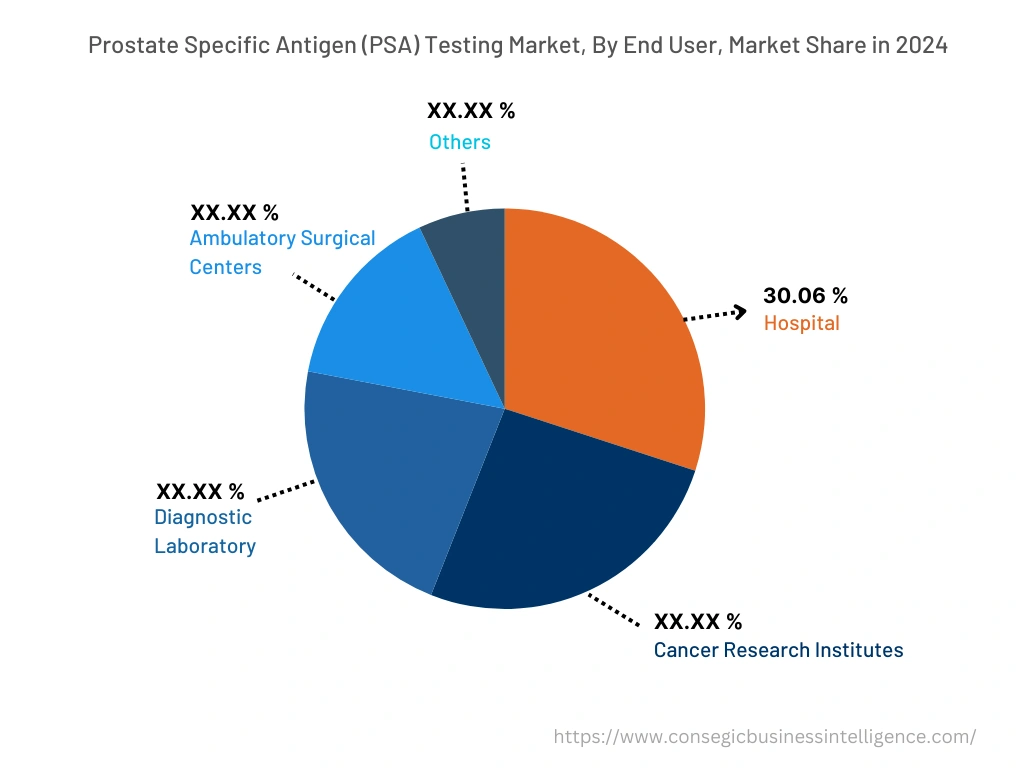
By Region :
The regional segment includes North America, Europe, Asia Pacific, Middle East and Africa, and Latin America.
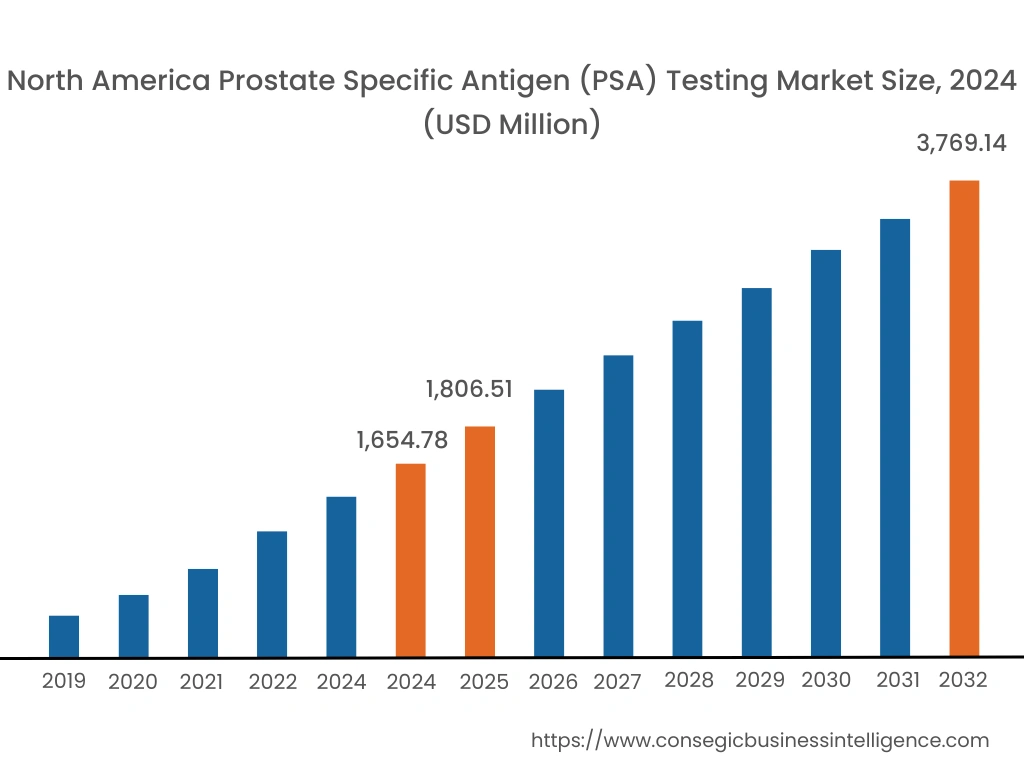
North America accounted for the highest market share of 40.05% and is estimated to reach over USD 3,769.14 Million by 2032 from a value of USD 1,654.78 Million in 2024 and is projected to grow by USD 1,806.51 Million in 2025. In North America, the U.S. accounted for the highest market share of 70.22% during the base year 2024 owing to the large number of PSA testing conducted in various healthcare settings, including hospitals, clinics, diagnostic laboratories, and specialized screening centers. In addition to this, international medical organizations such as the American Urological Association (AUA) have established guidelines recommending PSA testing for certain age groups and risk profiles. As a result, these guidelines have influenced healthcare practices in the North American region, contributing to an increase in PSA testing, in turn, accelerating the market growth.
However, Asia Pacific is expected to grow at the fastest CAGR of 11.9% during the forecast period due to the increase in technological advancements at medical facilities and laboratories that perform accurate PSA testing. In addition, the growing number of research institutes, hospitals, and medical centers actively involved in prostate cancer research is creating a positive growth outlook for the Prostate Specific Antigen (PSA) testing market.
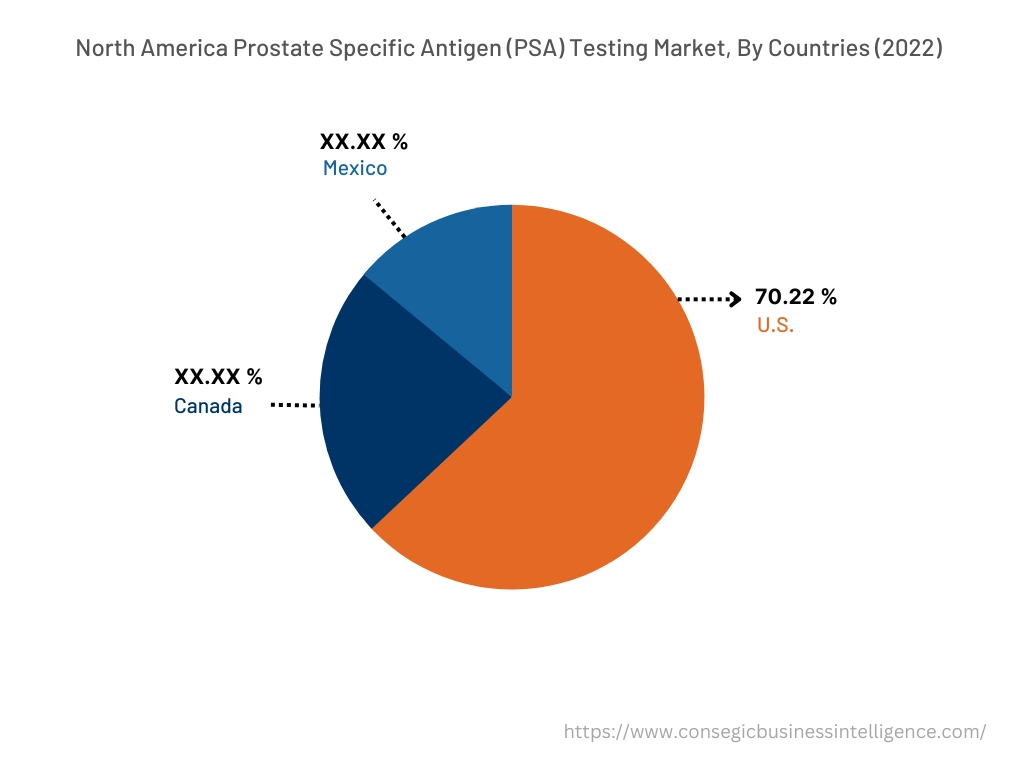
Top Key Players & Market Share Insights :
The Prostate Specific Antigen (PSA) Testing Market is highly competitive, with several large players and numerous small and medium-sized enterprises. These companies have strong research and development capabilities and a strong presence in the market through their extensive product portfolios and distribution networks. The market is characterized by intense competition, with companies focusing on expanding their product offerings and increasing their market share through mergers, acquisitions, and partnerships. The key players in the market include-
- Bio-Rad Laboratories, Inc.
- AdvaCare Pharma
- BioReference Health, LLC (OPKO Health, Inc.)
- Laboratory Corporation of America Holdings
- Hanzhou Testsea biotechnology co., LTD.
- Beckman Coulter, Inc.
- Proteomedix
- Fujirebio (H.U. Group)
- GE HealthCare
- Abcam plc
- Lomina AG
Recent Industry Developments :
- In December 2021, OPKO Health received U.S. FDA approval for the 4Kscore Test, a Prostate Specific Antigen (PSA) test kit.
Key Questions Answered in the Report
What was the market size of the Prostate Specific Antigen (PSA) Testing Market in 2024? +
In 2024, the market size of prostate specific antigen (PSA) testing was USD 4,988.66 million
What will be the potential market valuation for the Prostate Specific Antigen (PSA) Testing Market by 2032? +
In 2032, the market size of prostate specific antigen (PSA) testing will be expected to reach USD 11,629.56 million.
What are the key factors driving the growth of the Prostate Specific Antigen (PSA) Testing Market? +
Increasing prevalence of prostate cancer and growing awareness regarding the risks are the key factors driving the growth of the prostate specific antigen (PSA) testing market.
What is the dominating segment in the Prostate Specific Antigen (PSA) Testing Market by product? +
In 2024, the hospital segment accounted for the highest market share of 30.06% in the overall Prostate Specific Antigen (PSA) Testing Market.
Based on current market trends and future predictions, which geographical region will have the fastest impact on the Prostate Specific Antigen (PSA) Testing Market's growth in the coming years? +
Asia Pacific is expected to be the fastest-growing region in the market during the forecast period.
